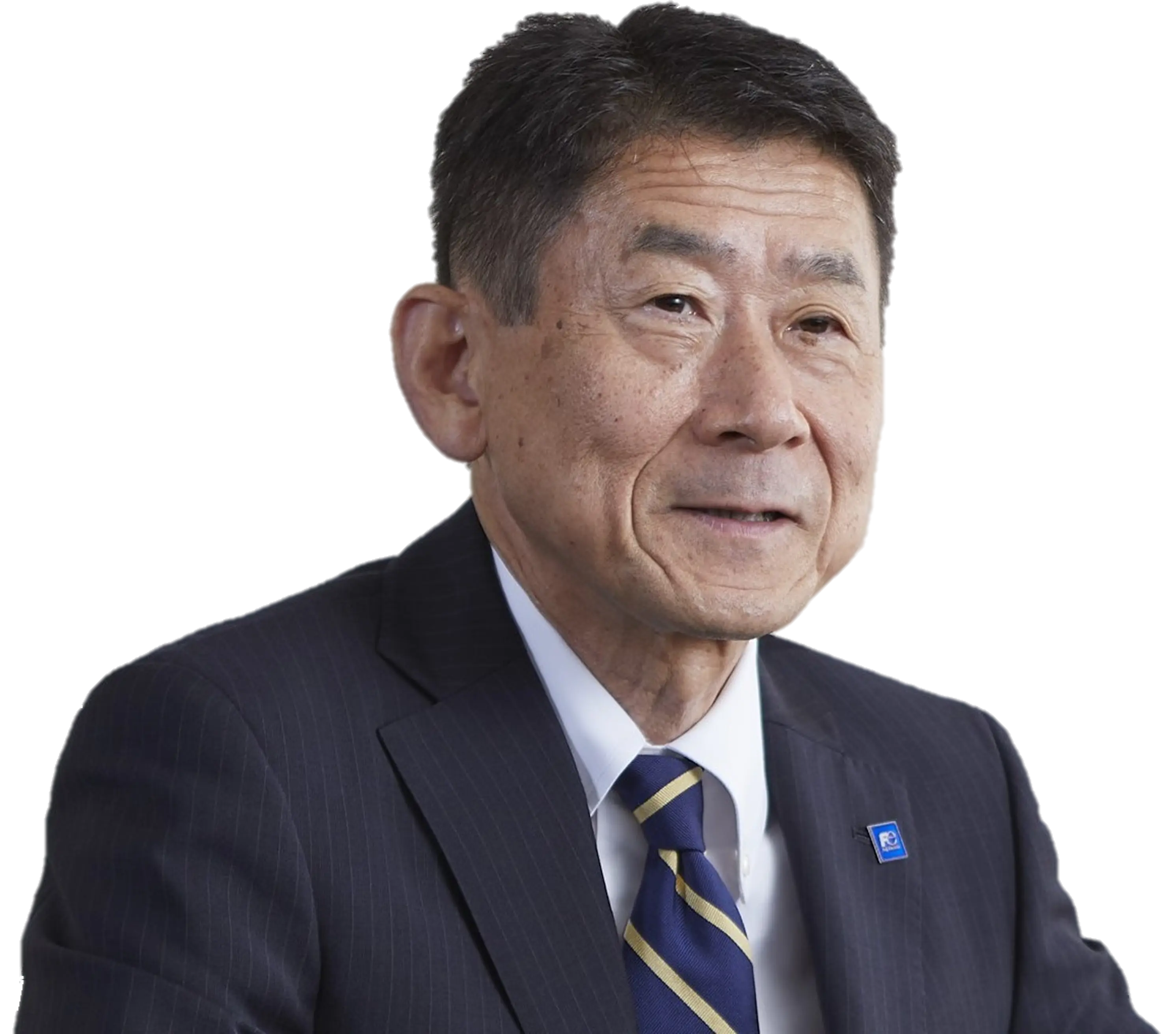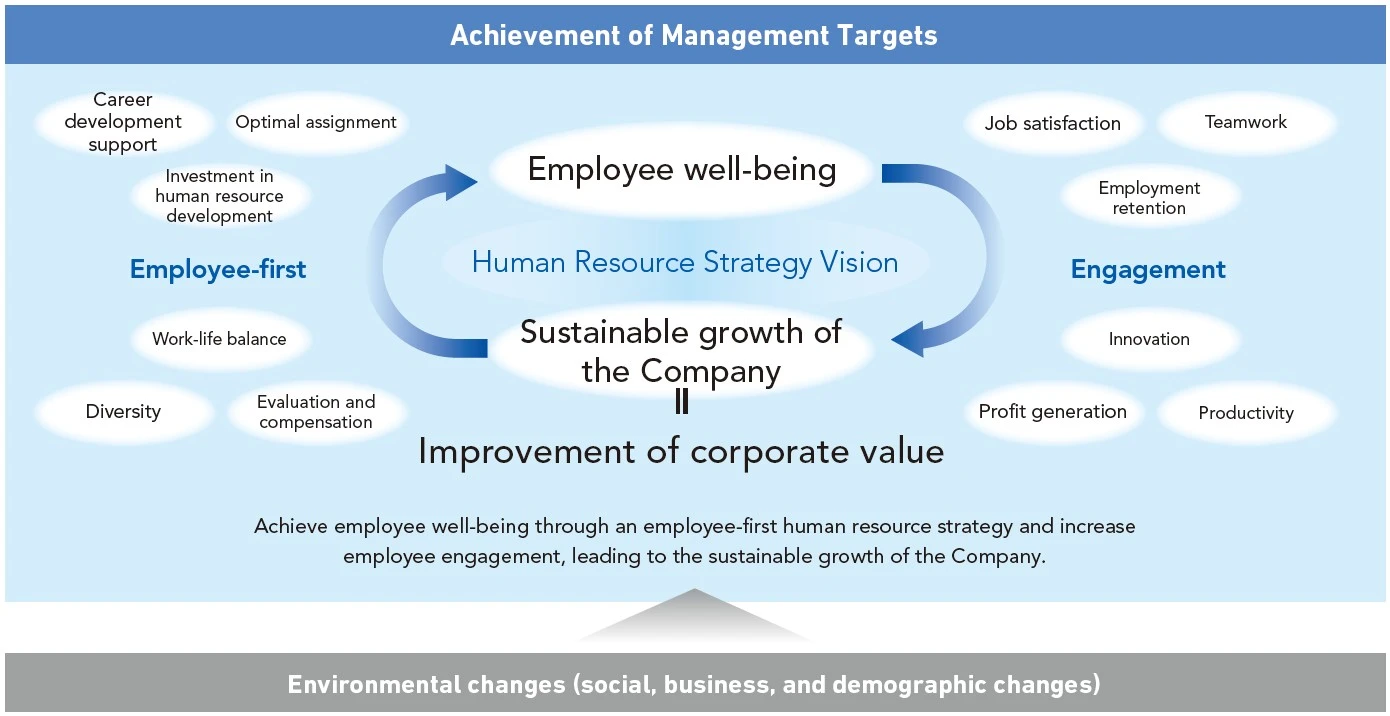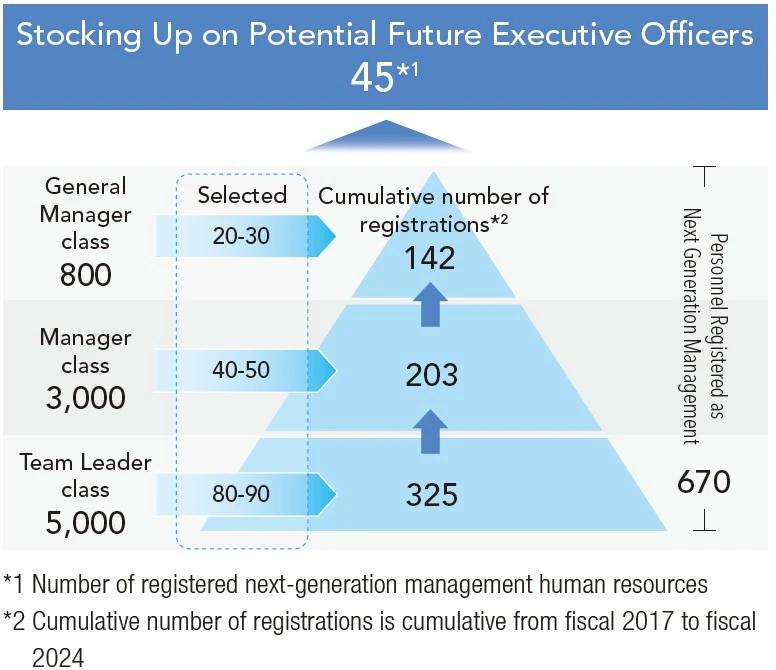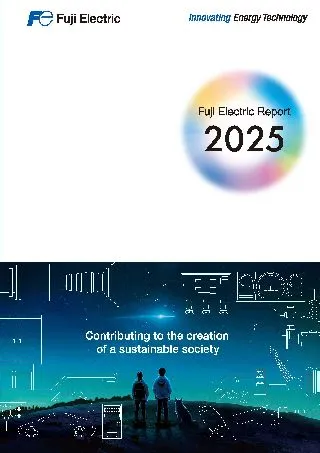IR Information
Human Resources Cross-Functional Strategy Supporting Business Growth Fuji Electric Report 2025

We will achieve employee well-being and sustainable growth of the Company based on an employee-first approach.
Managing Executive Officer
General Manager, Human Resources and General Affairs Office
Takeshi Kadoshima
One of Fuji Electric’s management policies is to “maximize our strengths as a team, respecting employees’ diverse ambition,” and the Fuji Electric Code of Conduct states that we will respect and value all people. We consider respect for human rights, health and safety, and the protection of our employees’ health to be the foundation of our business activities and actively invest in people to encourage activities, training, and suitable assignment of human resources, which become the core of our efforts to achieve the sustainable growth of the Company.
In an environment in which the future is not easy to predict and a shift to new values is underway, the most important thing for the Company to continue to grow sustainably is our human resources. In the rapidly changing business environment, we are developing various measures to nurture human resources who can continue to create new added value while working under our management strategies to adapt to changes in the environment.
The human resource strategy in the FY2026 Medium-Term Management Plan sets forth a vision of realizing a virtuous cycle of employee well-being and sustainable growth for the Company while continuing our employee-first approach. Through human resources management that respects individuality and diversity, we will aim to enhance corporate value through human resources by globally promoting the development of a system that enables each employee to feel happy working for Fuji Electric while autonomously increasing productivity, and an environment in which diverse human resources can transcend the boundaries of their divisions and regions as well as demonstrate their collective strengths as a team.
Human Resource Strategy Linked with the Management Strategy
The foundation of Fuji Electric’s human resource strategy is to enhance corporate value by bringing out the full potential of every employee through a virtuous cycle of employee well-being and the Company’s sustainable growth, and by cultivating human resources who can adapt to changes in the surrounding environment.

Our Vision and Important Issues
Aiming for a virtuous cycle of employee well-being and the Company’s sustainable growth, we are working on human resource measures, positioning “Promoting the active participation of diverse human resources” and “Improving job satisfaction” as important issues.
Respect for Human Rights
Based on international human rights norms such as the Universal Declaration of Human Rights and the United Nations Guiding Principles on Business and Human Rights, we are working to establish a sustainable corporate structure that is never involved in or complicit in human rights violations. Based on our Policy for Human Rights of the Employees, we implement a human rights and labor assessment as a part of our human rights due diligence* for our operating sites in Japan and our consolidated subsidiaries in Japan and overseas.
Fiscal 2024 was an implementation year for our biennial human rights and labor assessment, and we conducted an analysis of human rights risks using self-assessment questionnaires (SAQs) at each base. No significant human rights risks were identified, but for seven subsidiaries where initiatives were insufficient in areas such as “overtime work exceeding regulations and labor-management agreements” and “existence of a health and safety policy,” we took countermeasures and improved the situation.
In fiscal 2025, we will re-confirm the improvement status of the human rights and labor assessment, and we will continue to do so as an ongoing initiative. In addition, we will continue to conduct annual human rights education for all employees.
Status of the Human Rights and Labor Assessment
Promoting Active Participation of Diverse Human Resources
Promoting the Active Participation of Female Employees
To realize the Company’s sustainable growth through adaptation to change and the creation of new value by diverse human resources, we are enhancing our workplaces so that diverse human resources can play an active role. In particular, we are strengthening measures to promote women’s active participation.
We are promoting initiatives from three perspectives: recruitment, career development support, and the creation of a comfortable working environment. The ratio of females hired has remained above 20% since fiscal 2018. We are continuing to implement measures that lead to career development for female employees, including a mentorship program (Sister System) for young female employees.
Under our medium-term human resource strategy through fiscal 2026, we plan to introduce a mentorship program for female employees who are aiming for management positions, with the goal of producing female officers.
Main Initiatives
Promoting the Active Participation of Senior Employees
From the perspectives of the aging of our labor force and of securing our workforce, we are focusing on promoting the active participation of our senior employees. We consider our senior employees aged 60 or older, who have abundant experience and associated skills and knowledge regarding our products that have long service lives, to be a valuable asset, and we are striving to strike a balance between the fulfillment of our employees’ lifelong careers and business continuity.
For general employees, we previously operated the Selective Retirement Extension System, which allowed them to choose a retirement age between 60 and 65. However, to further promote the active participation of senior employees, from fiscal 2025, we have made the retirement age a uniform 65 and have raised the remuneration level. For managers, we have introduced the Senior Task System, which allows them to maintain their pre-60 compensation level depending on their performance. In addition, we have established company-wide Employment Guidelines for Employees over 65, which enables such employees to remain active up to age 75. As of March 2025, 444 employees are actively working under this system, primarily in plant engineering and successor mentoring.
Promoting the Active Participation of Differently Abled People
Fuji Electric established Fuji Electric Frontier Co., Ltd. in 1994 as a special-purpose subsidiary under the Act to Facilitate the Employment of Persons with Disabilities. Fuji Electric Frontier has been gradually expanding its scope of activities by hiring differently abled people and expanding their scope of duties. To further promote the active participation of differently abled people, in addition to its major duties of internal document delivery and cleaning, it is actively working to expand the scope of duties to include manufacturing support and lightduty work.
As of June 2025, we employed 462, and the employment ratio of differently abled people was 2.99%, well above the statutory employment rate (2.5%). We will continue striving to hire about 15 differently abled people per year as we secure and expand duties available to them and work on achieving stable employment.
Initiatives to Cultivate Human Resources
In the Fuji Electric Code of Conduct, we have expressed our commitment to reinforce human resource cultivation to achieve the development of each individual employee as well as the collective strength of the team. We are working to enhance the cultivation of human resources who can demonstrate strong leadership and a high level of expertise by bolstering employee skill development and increasing our investment in education.
Cultivating Next-Generation Management
To achieve sustainable growth, we actively engage in cultivating future management personnel.
There are three main points to such cultivation: first, careful selection of those to be trained while they are young; second, systematic on-the-job training that requires business and job rotation as well as experience in overseas operations; and third, participation in selective training programs. Once a year, we share and discuss progress with respect to each of these points with our Executive Officers in order to enhance the program content.
From among this initiative’s participants, one Executive Officer was appointed in fiscal 2024 and another in fiscal 2025.

Fostering Global Human Resources
To expand our overseas business, since fiscal 2017, we have been promoting a company-wide global human resource development system. This includes the development of Japanese employees by dispatching them to our overseas bases (55 employees in total since fiscal 2017), providing training in Japan to employees from overseas bases (117 employees in total), and operating and improving language classes in Japan (1,998 employees in total). Furthermore, since fiscal 2023, we have been advancing initiatives to promote the cultivation of human resources for future management executive candidates to foster autonomous local operations at our overseas bases. In fiscal 2024, seven of these candidates participated in a special program that included group training in Japan.
Career Development Support
To enable diverse human resources to realize “autonomous and productive work styles,” we are working on human resource development through reskilling to meet business needs, upskilling to improve productivity, and support for autonomous career development.
In fiscal 2024, we worked to revitalize our open application system, and 28 employees were transferred to their desired divisions. In addition, as part of our career development support for individuals, we conducted a trial of career training by generation in which a total of 380 employees participated. We plan to fully implement such training from fiscal 2025.
Creating a Motivating Workplace
Workstyle Reforms
We are promoting workstyle reforms from the twin perspectives of promoting the active participation of diverse human resources, including enhancing work-life balance and providing work-life balance support, and increasing productivity by improving work quality and efficiency.
In fiscal 2024, both average overtime hours and average vacation days improved, to 18.6 hours/month (a decrease of 1.3 hours from the previous fiscal year) and 18.3 days/year (an increase of 0.2 days from the previous fiscal year), respectively. Overtime restrictions for the construction industry came into effect in fiscal 2024, but no legal violations occurred.
In addition, we strengthened our work-life balance support system by eliminating the upper limit on the number of days for remote/satellite office work for nursing and family care reasons.
In terms of the workplace environment, we are promoting a hot desking system in Osaki district with the aim of improving productivity by creating an environment that is easier to work in.
Communication with Employees
To understand employee awareness in a timely manner, we conduct an annual employee awareness survey consisting of a total of 95 questions to make fixed-point observations on overall employee awareness, including satisfaction toward the Company, the workplace, and their jobs (see P52 for excerpts of the FY2024 survey results).
The survey results are directly linked to human resource measures such as strengthening the management of middle managers, supporting employee career development, and expanding various educational and training programs.

